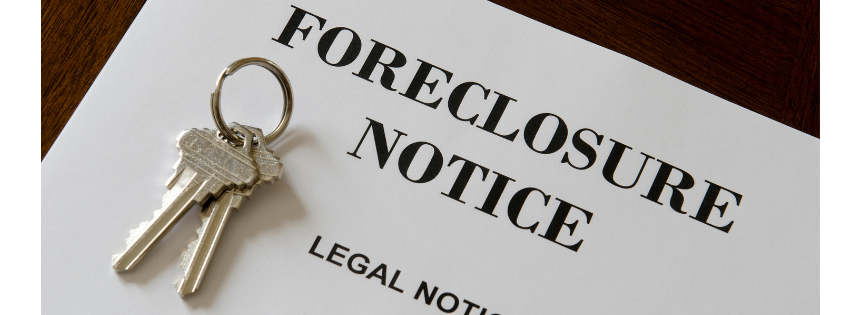
Life doesn’t always go as planned. Maybe you’ve lost your job, went through a tough divorce, faced unexpected medical bills, maybe your home has suffered hurricane damage and you’re stuck in a triangle between FEMA, insurance, and the mortgage company, or you simply bought a home you can’t afford anymore. With these types of situations, some homeowners start giving up & thinking about just… walking away from their mortgage. The burden and the stress is just too much and they can’t take it anymore. Who can blame them? But what actually happens if you walk away from your mortgage in Florida? Read along for the inside scoop.
What Does “Walking Away” Really Mean?

When people say they’re “walking away” from their mortgage, they’re basically talking about stopping their mortgage payments and letting the bank take the house back. This is also called a “strategic default” if someone can still afford the payments but they decide it’s not worth paying.
This is common for homeowners that are severely underwater, have high ticket repairs that would hinder them from listing the property on the market. For instance, major roof leaks, mold, hurricane damage, etc.
It might sound tempting—just stop paying and move on. But the reality is more complicated (and often messy). In Florida, your lender doesn’t just shrug and say “oh well, I guess we’ll just sell the house to get our money back.” There are serious consequences you should understand before making any decisions.
Florida Is a Recourse State
Florida is what’s called a “recourse state.” This means that after foreclosure, your lender can pursue a deficiency judgment against you. This recourse also depends on the type of loan you have. So what does that mean?
If the bank sells your foreclosed home for less than what you owe, they can come after you for the difference. Let’s say you owe $300,000 on your mortgage but the home sells at auction for $200,000. That leftover $100,000 is called a deficiency, and in Florida, the lender can legally try to collect it. This can lead to wage garnishment or other actions to collect the deficiency. In Florida, the lender has one year from the date of the certificate of title is issued to the buyer to file a deficiency judgment.
That’s a big deal! Many homeowners think they can just walk away and be done, but in reality, that unpaid amount could follow you for years.
Foreclosure Process in Florida
If you stop paying your mortgage, your lender will eventually start the foreclosure process. Florida uses a judicial foreclosure process, which means the lender has to sue you in court. Here’s a simplified timeline of what that might look like in Florida.
1️⃣Pre-Foreclosure:

- Default: Occurs after missed mortgage payments, often after 3 or more payments are missing.
- Notice of Default: Lender sends this formal notification of the default, starting the foreclosure clock.
- 120-Day Waiting Period: Lenders in Florida must wait at least 120 days after the borrower becomes delinquent before filing a foreclosure suit. To learn more click here
- Lis Pendens and Complaint: Lender files a lis pendens (notice of a pending lawsuit) and a legal complaint in court to initiate foreclosure.
- Summons and Service: Borrower is formally served with the lawsuit and summons.
- Response Time: Borrower has 20 days to respond to the complaint.
2️⃣Foreclosure Litigation:
- Answer/Defense: If the borrower responds, they can present defenses to the foreclosure.
- Summary Judgment: If the borrower doesn’t have a strong defense or the case is uncontested, the lender might pursue a summary judgment, potentially avoiding trial.
- Foreclosure Sale Date: If the lender is successful, the court sets a date for the foreclosure sale, usually within 30-90 days.
Auction:
The property is sold at auction to the highest bidder, often the lender will set a reserve for the sale. This reserve is the minimum they will allow the house to sell for. If the property does not meet the banks requirements at auction the bank will take ownership and schedule it to sell with a real estate broker on the open market. These are called REO’s-short for Real Estate Owned.
Deficiency Judgment: After the sale, whether its a short sale, auction, or deed in lieu, the lender can file for a deficiency judgment to recover the remaining debt.
Walking away from your mortgage and the Impact on Your Credit

Walking away from your mortgage has significant consequences , both financially and legally. This decision could potentially have long lasting negative effects on your financial well being , also on your ability to secure housing in the future.
Walking away from your mortgage can make it difficult to:
- ⚠️Buy another house: It will become difficult to qualify for a new mortgage to purchase another home, with some government agencies like Fannie Mae imposing a waiting period of up to seven years. Even renting a home or apartment may also be challenging, as landlords often check credit reports during the application process.
- ⚠️Get loans or credit cards: Your credit score will take a major hit. Missed payments and the subsequent foreclosure can cause your score to drop by over 100-200 points, depending on your initial credit standing. This negative mark remains on your credit report for up to seven years.
- ⚠️Potential for Deficiency Judgments: In Florida, lenders can pursue a deficiency judgment against you, even after the foreclosure sale, if the sale proceeds are less than the outstanding mortgage debt. This court order allows the lender to collect the difference through means such as wage garnishment or bank account levies.
- ⚠️Even get certain jobs (some employers check credit history) Some employers run credit checks on job applicants, and a foreclosure on your credit report could negatively affect your job prospects, particularly in industries like finance or banking.
- ⚠️Tax Implications: If your lender forgives any part of the mortgage debt, the IRS may consider this as taxable income. Consult with a tax professional to understand the potential tax consequences in your specific situation.
Before you consider walking away from your mortgage consider talking with a HUD counselor or foreclosure attorney. They can guide you along the way and help you understand the potential consequences you would face. You could explore alternatives such as a loan modification, short sale, cash offer, etc.
Sell Your Orlando House Fast For Cash
We Buy Houses In Orlando For Cash. No Repairs Or Fees. Get A Fair Offer And Close In As Little As 7 Days!
Can You Just “Give the House Back to the Bank” to Avoid Foreclosure?
Some people think they can just hand the keys back to the bank in a process called “deed in lieu of foreclosure.” While this is a real option, it’s not as simple as it sounds.
The lender has to agree to take the deed back instead of going through foreclosure. In exchange, you avoid the public auction and might reduce the credit damage slightly. However, lenders often still reserve the right to pursue a deficiency unless they explicitly waive it in writing.
*Also, if there are other lien holders on the house they all have to agree to the “deed in lieu”
If your lender forgives part of your mortgage debt (like in a short sale or deed in lieu), the forgiven amount might be considered taxable income by the IRS. There are some exceptions and relief programs, but it’s essential to talk to a tax professional to understand your situation.
Alternatives to Walking Away From Your Mortgage

If you’re struggling to make payments, it doesn’t have to end with walking away. There are other options you might consider:
1️⃣ Loan Modification
This involves negotiating with your lender to change the terms of your loan. Modifications may involve, lowering your monthly payment, extending the number of years you have to pay the loan back, reducing your interest rate and/or forbearing or reducing your principal amount. It’s important to understand the modification and how it will change your monthly payments and the total amount you owe.
2️⃣ Short Sale
A short sale means selling your home for less than what you owe, with the lender’s permission. The lender gets the sale proceeds and may forgive the remaining debt. In Florida, you should always get written confirmation that the lender will waive the deficiency.
3️⃣ Forbearance
A temporary reduction or pause in payments, usually during a short-term financial hardship. This can give you breathing room to get back on track. You still owe the full amount, you just pay back the difference later.
4️⃣ Sell Your House Before Foreclosure
If you have equity (or even if you don’t), you can try selling your home on the open market before foreclosure proceedings start. This helps you avoid the hit to your credit and gives you more control over the sale. It’s a great opportunity to try and recoup some equity you may have built up. You can list your property with a realtor or sell to a cash home buyer.
| Listing with a Realtor | Selling to a Cash Buyer | |
| Pros ✅ | ✔Potential to get top dollar if market is strong ✔Professional marketing & exposure to many buyers ✔ Guidance through inspections, negotiations, and paperwork ✔Possible help with staging and prepping the home | ✔Fast closing (as little as 7 days) ✔ Sell as-is, no repairs, no clean out or cleaning needed ✔ No agent commissions or fees ✔ Avoid showings and open houses ✔ More privacy (fewer people walking through your home) ✔ No contingencies like financing, inspections, appraisal, home sale, etc. |
| Cons ❌ | 🚫May need to make repairs or updates to attract buyers 🚫 Showings and open houses can be stressful and intrusive 🚫Sale can fall through if buyer financing fails 🚫 Agent commissions and closing costs reduce your net proceeds 🚫Longer timeline (can take months to close) | 🚫 Offer is below market value 🚫Less opportunity for bidding wars 🚫Beware of scams |
5️⃣ Bankruptcy
In some cases, filing for bankruptcy might help you avoid foreclosure or eliminate the deficiency. However, this is a big step and requires advice from a qualified bankruptcy attorney.
Sell Your Florida House Fast For Cash
We Buy Houses In Florida For Cash. No Repairs Or Fees. Get A Fair Offer And Close In As Little As 7 Days!
Before You Walk Away From Your Mortgage
Walking away from your mortgage isn’t just a financial decision—it’s an emotional one too. You might feel relief at first, but losing your home can be traumatic. There’s also the stress of moving, the uncertainty of where you’ll live next, and the potential strain on family relationships.
Plus, think about your future goals. Do you want to own a home again someday? Do you need to protect your credit for future opportunities? These are big questions that require careful thought and planning. The best thing you can do is get informed and explore every option before deciding to walk away. Here’s a quick action plan:
- Talk to your lender: Many lenders have hardship departments that can work with you.
- Consult a housing counselor: HUD-approved housing counselors offer free or low-cost advice.
- Talk to an attorney: Especially if you’re considering bankruptcy or worried about deficiency judgments.
- Understand your numbers: Know exactly how much you owe, what your home is worth, and what you can realistically afford.
- Talk to a Real Estate Professional: They will help you determine the value of your home. They can give you solid advice on the market so you can determine how to proceed.
Conclusion
Walking away from your mortgage in Florida might seem like an easy escape, but it can come with serious consequences: legal, financial, emotional, and practical. There’s no one-size-fits-all answer, and what’s right for one person might not work for another.
Before making such a big decision, take the time to explore all your options. Talk to professionals, weigh the pros and cons, and think about both your short-term relief and long-term future

About The Author
Jessica is a licensed Real Estate Broker with Acquire Realty Group in the state of Florida. She has been buying and selling real estate since 2006. With almost 20 years of real estate experience she is an investor at heart, specializing in helping homeowners that have distressed properties such as: Tax delinquent, foreclosure, creative financing, probate, inheritance, hoarding houses, liens, and more. All publications are opinion based formed by experience. If you are seeking tax or legal advice it is recommended that you contact a licensed CPA and/or Attorney for your specific needs. If you’d like to learn more about how Particular Properties can help you please click button below!
![companies that buy houses [market_city]](https://image-cdn.carrot.com/uploads/sites/77504/2025/02/Company-That-Buys-Houses-1920x800.jpg)
